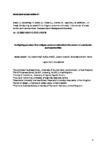Configuring perceived fit to mitigate consumer animosity in the context of cross-border sport sponsorships.
| dc.contributor.author | Angell, R | |
| dc.contributor.author | Bottomley, P | |
| dc.contributor.author | Brečić, R | |
| dc.contributor.author | Filipović, J | |
| dc.contributor.author | Gorton, M | |
| dc.contributor.author | Logkizidou, M | |
| dc.contributor.author | White, John | |
| dc.date.accessioned | 2020-05-07T15:57:58Z | |
| dc.date.issued | 2020-05-20 | |
| dc.identifier.issn | 1618-4742 | |
| dc.identifier.issn | 1746-031X | |
| dc.identifier.uri | http://hdl.handle.net/10026.1/15647 | |
| dc.description.abstract |
Abstract Research question: While cross-border sport sponsorships are widespread, such partnerships introduce a notable complication – consumers in one country may dislike the sponsor’s country of origin (COO). This raises the question as to whether animosity towards a sponsor’s COO negatively affects sponsorship outcomes, and if so, how it can be addressed. For the latter, we examine holistic sponsor-object fit as well as a set of its constituent elements. Research methods: Data collection pertained to a brand engaged in a hypothetical sponsorship. Study 1 involves a Serbian brand sponsoring the Croatia national football team and for Study 2 German sponsors of the England national football team. Survey data are analyzed using a latent modeling approach. Results and findings: Study 1 shows that animosity reduces consumers’ attitude towards the sponsorship. However, higher perceived sponsor-object fit weakens this effect. Study 2 replicates this finding, and on a more granular level establishes the moderating properties of several sub-dimensions of fit. Congruence in color, personality and status ameliorate animosity. Implications: We outline implications for sponsors operating in environments where their COO invokes animosity and how sponsor-object fit may mitigate this. | |
| dc.format.extent | 605-624 | |
| dc.language | en | |
| dc.language.iso | en | |
| dc.publisher | Taylor & Francis (Routledge) | |
| dc.subject | animosity | |
| dc.subject | country of origin | |
| dc.subject | perceived fit | |
| dc.subject | sponsorship | |
| dc.title | Configuring perceived fit to mitigate consumer animosity in the context of cross-border sport sponsorships. | |
| dc.type | journal-article | |
| dc.type | Journal Article | |
| plymouth.author-url | https://www.webofscience.com/api/gateway?GWVersion=2&SrcApp=PARTNER_APP&SrcAuth=LinksAMR&KeyUT=WOS:000536398000001&DestLinkType=FullRecord&DestApp=ALL_WOS&UsrCustomerID=11bb513d99f797142bcfeffcc58ea008 | |
| plymouth.issue | 4 | |
| plymouth.volume | 21 | |
| plymouth.publication-status | Published | |
| plymouth.journal | European Sport Management Quarterly | |
| dc.identifier.doi | 10.1080/16184742.2020.1765828 | |
| plymouth.organisational-group | /Plymouth | |
| plymouth.organisational-group | /Plymouth/Faculty of Arts, Humanities and Business | |
| plymouth.organisational-group | /Plymouth/Faculty of Arts, Humanities and Business/Plymouth Business School | |
| plymouth.organisational-group | /Plymouth/REF 2021 Researchers by UoA | |
| plymouth.organisational-group | /Plymouth/REF 2021 Researchers by UoA/UoA17 Business and Management Studies | |
| plymouth.organisational-group | /Plymouth/Users by role | |
| plymouth.organisational-group | /Plymouth/Users by role/Academics | |
| dcterms.dateAccepted | 2020-05-04 | |
| dc.rights.embargodate | 2021-11-20 | |
| dc.identifier.eissn | 1746-031X | |
| dc.rights.embargoperiod | Not known | |
| rioxxterms.versionofrecord | 10.1080/16184742.2020.1765828 | |
| rioxxterms.licenseref.uri | http://www.rioxx.net/licenses/all-rights-reserved | |
| rioxxterms.licenseref.startdate | 2020-05-20 | |
| rioxxterms.type | Journal Article/Review |


